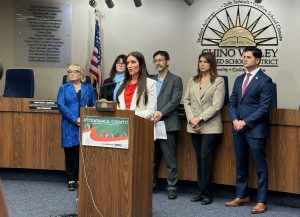Last year, California passed an unconstitutional law that regulates social media companies and requires online platforms to report to the California Attorney General on multiple topics pertaining to speech, including misinformation, disinformation, extremism, radicalization, and hate speech. Under AB 587, the state can fine social media outlets and force compliance if the platforms don’t provide the legally-mandated information.
While lawmakers claim this bill is about “transparency,” it’s clear that their real intention is to give government officials the power to censor ideas they don’t like.
Explaining why he signed the bill into law, Gov. Newsom said “California will not stand by as social media is weaponized to spread hate and disinformation that threaten our communities and foundational values as a country.”
When the government and Big Tech come together to decide what Internet users can and cannot say, platforms typically begin circulating one-sided narratives. This is no accident. Social media platforms are the public forums of the modern age, and by controlling speech on these platforms, the left-leaning government can dangerously influence, if not control, public opinion.
“…censorship guards the narrative, not the truth. In fact, it guards the narrative at the expense of the truth,” said The Babylon Bee CEO Seth Dillon in a testimony before Congress.
Thankfully, the Babylon Bee is suing California’s attorney general over this clear violation of the First Amendment.
The complaint begins by noting that both Gov. Newsom and Attorney General Bonta have expressed a desire to abuse state power to censor constitutionally protected speech that they refer to as “disinformation,” “hate speech,” and “extremism.”
“AB 587, the statute at issue in this case,” the Babylon Bee complaint continues, “is a vehicle for these unconstitutional ambitions….While aimed primarily against large social media platforms, AB 587 chills speech of those platforms’ users by incentivizing large platforms to censor speech based on viewpoint. The statute also impacts smaller social networks by imposing an industry standard of viewpoint-based censorship. In this regard, the data the platforms are required to provide the State under AB 587 is not about satisfying some academic curiosity, but rather to cast platforms that do not censor enough as pariahs.”
The attorneys went on to say that under AB 587, not all content is equal. The law imposes “burdensome reporting requirements, which are attached to significant penalties,” only on specific types of speech, including “hate speech” “racism,” “extremism,” “radicalism,” “disinformation,” “misinformation,” “harassment” or “foreign political interference.” Meanwhile, the law allows platforms to disseminate harmful content like child pornography.
The complaint also argues that terms such as “hate speech,” “racism,” etc. are “notoriously difficult to define.” AB 587 allows the government and Big Tech to arbitrarily decide what speech is “hateful.” However, to the left, “hateful” speech is often just the truth. Truth is hate, to those who hate the truth.
Some of the largest social media networks are headquartered in the state of California, meaning the state has a heavy influence on social media policy. Therefore, the success of this lawsuit is crucial. Free speech and unfettered debate are at the heart of our democracy.
“Whoever would overthrow the liberty of a nation must begin by subduing the freeness of speech.” -Benjamin Franklin










